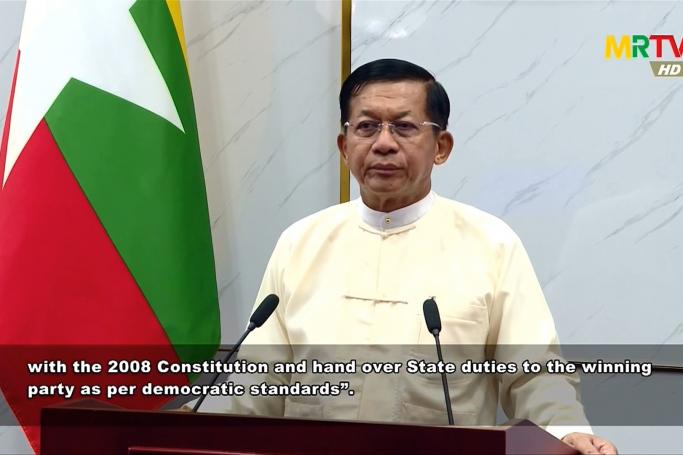The junta propaganda leader General Zaw Min Tun said that it is still too early to say whether the election will be held or not.
It has been a controversial topic among the public. Some are wondering if the military junta is really going to back out of the elections because of the disapproval of the people, revolutionary forces and international organisations.
But, junta leader Min Aung Hlaing is committed to election preparations.
On 23 January, he met with U Thein Soe, the Chair of the junta Union Election Commission (UEC), and legal experts. Reportedly, he focused the discussion on the implementation of the election and the transfer of power to the winning party.
He also gave instructions related to the Political Parties Registration Law, which has been recently amended. He also told the UEC that registration should not be granted to any political parties that violate the 2008 Constitution.
He talked about the nationwide appointment of UEC staff and voter list validation, saying that the election would be held later in the year.
At the same meeting, he also claimed that he had come to an agreement with some ethnic organisations to strengthen the multi-party system, and build a union based on democracy and federalism.
It seems clear that he has already chosen his own path.
In order to legitimise the military coup, Min Aung Hlaing seems to have already made election plans a long time ago.
He referred to the 2008 Constitution to justify his coup, reasoning that he was just protecting it.
After the coup, he reformed the UEC that had been installed by the civilian government and replaced its nominees with ones who would obey him.
Then, he made them annul the result of the 2020 General Election.
According to existing laws, the UEC does not have the authority to cancel election results. Nevertheless, the junta- Chair of the UEC, U Thein Soe, not only annulled the whole election result but also made arrangements for future elections to be conducted under a PR System.
When he was previously the UEC Chair, U Thein Soe played a variety of tricks to help the military proxy Union Solidarity and Development Party (USDP) win the 2010 General Election.
Using proportional representation, the military proxy USDP is sure to win at least 26% of the seats in the parliament. When that is added to the mandatory 25% of seats automatically given to the military, Min Aung Hlaing’s presidential dream will surely come true.
Min Aung Hlaing replaced the former USDP Chair, U Than Htay with his right-hand man U Khin Yi and has installed his allies in all the important USDP positions.
To further stifle other political parties’ election chances the junta amended and adopted some laws.
In December the junta issued the Peaceful Gathering and Peaceful Procession Law, which could hinder political parties’ election campaigns.
According to junta laws, if people want to assemble they have to first inform the township police about the assembly and obtain permission for it in advance. This will seriously impact election campaigning because it seems that political parties will have to seek permission for any kind of rally or public meeting they want to hold.
But it seems that the rules will be different for the USDP, as the party has already started its election campaigning, even though the election has not yet been announced.
In areas such as Naypyitaw, Yangon, Bago, Mandalay and Southern Shan State, the USDP Chair U Khin Yi met with current and former party members and local organisations.
On 21 January, Bullet Hla Swe, the chair of the USDP Naypyitaw Branch, met with social organisations at Pyinmanar Township Office. He told them to cast votes for the USDP and help them win the election. There have been similar activities in other areas of Naypyitaw Union Territory.
Under functioning democratic systems, political parties should only be allowed to carry out election campaigns within a fixed period prior to the election and all parties should be allowed to campaign within that period.
Recently, the military junta released a new law governing the registration of political parties. According to the law, all the political parties have to re-register within 60 days. Any that fail to do so will be automatically removed from the list of political parties.
Political parties that wish to contest at a national level must prove that they have 100,000 members within 90 days of their registration being approved and have branch offices in at least 150 townships, half the total number in the country. They must also deposit at least 100 million kyats of party funds in the state-owned open Myanma Economic Bank. Each party will also have to stand a candidate in at least half of all constituencies nationwide.
Political parties that wish to contest in state or regional elections must have 1,000 members within 90 days of being approved and have funding of at least one million kyats. they must also have offices in at least five townships in the states or regions where they are standing candidates.
According to the military junta, political parties that fail to follow these regulations will be shut down and banned from competing.
This law will pose barriers to all parties that want to participate in the elections except for the military-backed USDP. It may even affect the three or four of the more disorganised parties that met with Min Aung Hlaing.
Judging from this, it is clear that Min Aung Hlaing is paving the way for a biased, undemocratic elections that will keep him in power.












